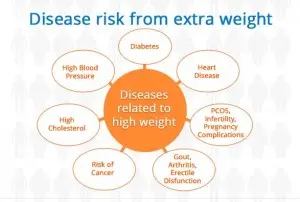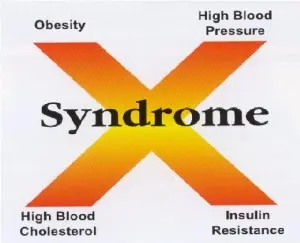Here we are at the beginning of a New Year. This is a common time where many of us reflect upon ourselves and decide that we need to make a change in our lives, commonly known as the New Year Resolution. One of the most common New Year Resolutions is to lose weight. But what happens to your body when you gain the weight in the first place?

The Centers for Disease Control (CDC) has labeled obesity as public enemy number one. According the CDC, in 2009-2010, one third of all U.S. adults are classified as obese. The CDC also predicts that 1 in 3 people born today will develop diabetes in their lifetime. Obese individuals have a higher risk of many health problems including:
- Metabolic Syndrome (Syndrome X) which includes:
- High Cholesterol
- Abdominal obesity
- high blood pressure
- Type 2 diabetes
- Certain types of Cancers
- Coronary heart disease and stoke
- Osteoarthritis
- Respiratory diseases

Metabolic Syndrome occurs when a person has at least 2 out of the 4 following hallmark symptoms: high cholesterol, high blood sugar, high blood pressure, or increased levels of abdominal fat. The physiological processes that occur resulting in Metabolic Syndrome are complex and complicated. But simply put, as you accumulate increased body fat, the body becomes more resistant to insulin. Since insulin is the hormone that allows the body to use glucose (sugar), the inability of the body to regulate the production of insulin often leads to type 2 diabetes. This can cause complications in other tissues/organs in the body due to the balance of insulin and glucose being out of check resulting in high blood pressure and high cholesterol levels.

According to the American Cancer Society, body weight seems to have the strongest evidence linking it to cancer. Being overweight is linked to increased risk of cancer in the breast, colon and rectum, uterus, esophagus, kidney, pancreas, gallbladder, liver, prostrate, cervix, and ovaries to name a few.
As increased levels of body fat accumulate in the body causing weight gain, the risk of heart disease also increases due to elevated cholesterol, increased inflammation in the blood vessels, increased formation of clots in the blood, and the blood becoming thicker and stickier due to higher levels glucose/proteins in the blood. As a result, the risk of having a stroke or heart attack greatly increases.
The increased stress on the joints of the body is another problem with weight gain. Walking results in a force of 3.5 times body weight on the lower body. The average person takes 10,000 steps a day. Imagine what you would feel like putting 50 pounds into a backpack and walking around all day with it strapped to your back. That extra 50 pounds is the equivalent of 175 lbs of force being absorbed by your ankles, knees, and lower back with each and every step. By the end of the day, this is over 1.75 million pounds of force being absorbed by the body. This causes unnecessary wear and tear on the cartilage (protective lining) of your joints. As a result, you may develop osteoarthritis as the bones of your knees, hips, ankles, shoulders and spine are no longer protected. The progression of the arthritic joints can result in needing surgery to replace the worn out joints. But, being overweight is also a risk factor for complications after joint replacement surgery.
Obese individuals also have a higher than normal rate of respiratory diseases such as sleep apnea and obesity hypoventilation syndrome. Being obese can also make treating asthma more difficult due to the inability to control the inflammation of the airways.
The list of health problems associated with obesity are many and can have a devastating effect on one’s quality of life. The good news is that many of these problems are avoidable. At Flex Physical Therapy, we have a program specially designed to help you lose weight effectively and keep the weight off even if you have joint problems and can’t exercise. Call 1-800-930-8803 now to schedule your free weight loss consultation or attend one of our free monthly workshops.



